#ALAIGW
Explore tagged Tumblr posts
Photo
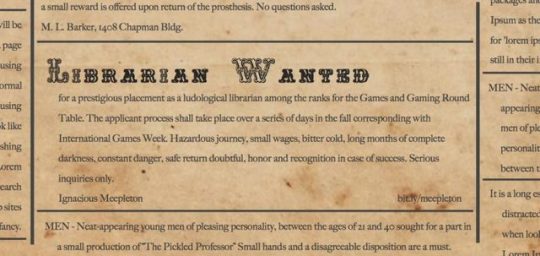
This week is International Games Week!
As part of the celebrations the Gaming Round Table is hosting a 5-day digital puzzle hunt. This hunt will challenge you while testing your knowledge of games and play. Every day this week a new stage of the puzzle will open. As you successfully complete each day’s puzzle, you will get a link to the gateway to the next day’s stage as well as a badge for bragging rights on social media. Here's the first stage - be sure to check the Games in Libraries blog all this week for news on the hunt and more fun IGW stories. Best of luck on your puzzling adventure!
19 notes
·
View notes
Photo
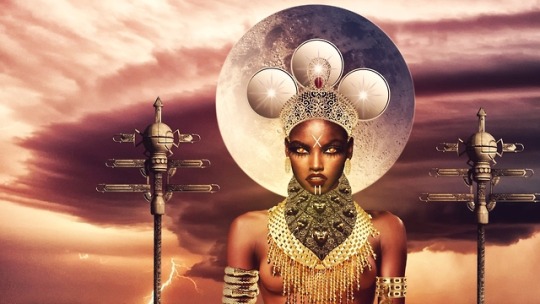
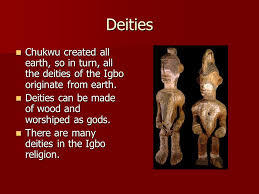
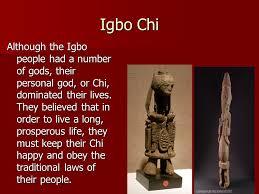
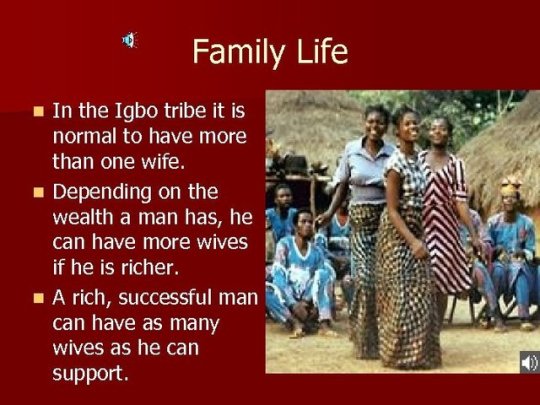
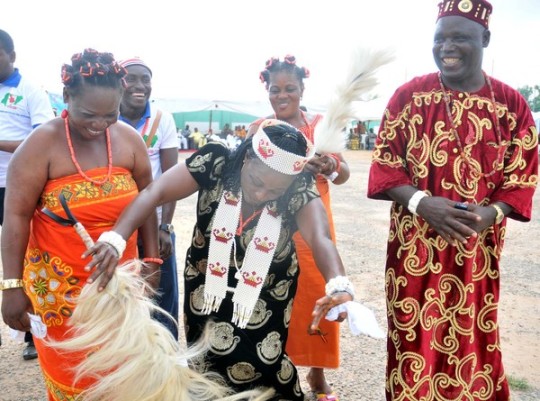
AFRICAN PHILOSOPHY: THE FUNDAMENTALS OF ODINANI BY M.O. ENE
Odinani is anchored on the sanctity of Ani, the Earth Deity, INTRODUCTION
The Igbo traditional religion is a philosophy that has stood the test of time. To understand the basis for Igbo philosophy, we must understand first the Igbo concept of the Cosmos, a logical concept that makes few pretensions about the great unknown. This concept has survived the introduction of Middle Eastern religious beliefs and modern science. The Igbo belief is therefore both metaphysical and scientific as well as sacred and socioenvironmental. A very tolerant but conservative philosophy, its capacity for ecumenism is enormous. While not yielding an inch to mythical and unproven concepts of life on earth, the Igbo philosophy maintains an elastic but credible concept of the Cosmos and its constituents that is rooted in science rather than the traditional myths of some imported beliefs.
To the ancient Igbo, the Cosmos is an endless space of visible and invisible beings. This Cosmo is divided into four complex constituents, [Onwuejeogwu, 1975: The Igbo Culture Area in “Igbo Language and Culture,” F. Chidozie Ogbalu & E Nolue Emenanjo -ed.]:
Okike (Creation)
Alusi (Supernatural Forces or Deities)
Mmuo (Spirit)
Uwa (World)
OKIKE
The Supreme Being (Chi ukwu or Chukwu) is the God of Creation (Chi Okike), the Force that fires all forces. God in Igbo language is also called Chineke (“God in the morning of creation, ” or “the God who creates” or “God and the Creator” (duality of deity)… depending on perspectives). Chineke is far removed from the perception of mere mortals. This Supreme Power (Ikekaike) is neither a living-dead (ancestor) nor a spirit. It has no known physical form, yet indirectly impacts the affairs of the human world. Chineke manifests to our world as:
Anyanwu (the Sun)—Chineke is the mastermind behind the source of light, love and knowledge and, implicitly, earthly existence or life itself;
Chi (the godly guardian), the personal providence is a divine agents assigned to each human from cradle to the coffin;
Kpakpando (the stars) which manifest as the celestial beauty;
Enuigwe (the heavens), the home of all supernatural forces including the stars.
Chineke created everything visible and invisible. The concept of Chineke is incomprehensible; to know God is the end of knowledge, which is probably why the Igbo do not debate those who say their ancestors dropped from the sky — who knows! The evil forces that intrude into our lives and the physical forces of the universe are all put in place by the Supreme Force, the Godhead or Creator, for definite reasons and to coexist in harmony and multiply and or evolve.
ALUSI
Alusi is a supernatural force. Although the forces are neither human beings (mmadu) nor spirits (mmuo), they sometimes assume the attributes of human beings. Prof. Onwuejeogwu called them “being forces.” Every Igbo town has a shrine dedicated to its communal alusi; every other community respects the deity. A priestly clan usually ministers to the revered communal deity on behalf of the community.
MMUO
Mmuo is the spirit of ancestors who lived, died, and moved on to the great unknown, the other side of the realm. Hence, mmadu (human beings) must die to become mmuo (spirit being). If a man was good while alive, upon his departure he could become an ichie or nna-mmuo —a hallowed ancestor spirit or a saint. Ancestor spirits are more commonly known by the collective term “Ndiichie.” A respected, living elder can therefore be called ichie —a living saint. Ndiichie is also used for a group of accomplished and distinguished elders who uphold the morals of the society, dispense unquestionable justic, and preserve the culture of the community.
A woman who has lived a distinguished life becomes nne-mmuo. Those who have lived horrible lives, and those who committed unpardonable sins (ajo njo) or alu (abomination) against Ani — the Earth Deity, become ajo mmuo (evil spirits) or Ekwensu (Devil or Satan). The male ajo mmuo could be akaliogoli (a roguish spirit); the female counterpart could become either a mermaid (owummiri) or a bloodsucking amaosu (vampire) or some other gender-specific evil spirit. Some mmuo are so restless they come back to be born-again (ogbanje), not to make amends but to torment a mother, her family, and the community. [This must not be confused with the desired and celebrated “inouwa” or reincarnation.]
UWA
Uwa is our world, or the so-called “Mother Nature.” [Compare with Hausa: uwa = mother]. This is the world we live in, the visible universe that directly impacts our life. Uwa is made up of two distinct parts: Igwe and Ala.
Igwe is the firmament, and it constitutes of the following:
Ulukpu (the clouds);
Onwa (the moon);
Alaigwe (the planets);
Ikuku (the winds) —the totality of winds and airs that hold the earth in place and help to make it everything it is.
While the ancient Igbo philosophers might not have measured the firmament by any known scientific method, they knew that it is immensely bigger than the earth, that the earth is but a revolving part — not the center — of the universe. Hence, the popular phrase Igwe ka Ala, which is also one of Chineke’s many names, Igwekaala.
Ala: Ala is the physical manifestation of Earth Deity, Ani. It harbors four components:
Mmadu (human being) — Man and woman exist to perform specific functions in the complex equation of conservation and preservation of the species. Humans are the beauty of life; hence it has been suggested that the word is from “mma ndu” = the beauty of life.
Anumanu (animal) — Like human beings, animals have their specific functions in the equation of life;
Ofia (forests) Vegetation sustains both mmadu and anumanu.
Mmiri (water) —The “life” of fish and all other beings in all water bodies is dependent on the quality of water. When the Igbo pray, they pray for the “life” of water because it is also the life of fish, which invariably provides rich sources of protein for humanity. Therefore, pollution of streams in Igboland is a taboo. All community streams are sacred and water fountains are deities, iyi. Menstruating women should not step into communal streams to fetch water. In some communities, women of childbearing age are banned all together from fountains.
GOLDEN RULE
The Igbo are very particular about constructive coexistence on earth. In the saying, “egbe bere ugo bere” (Let the eagle perch, let the hawk perch), the Igbo express the golden rule of the religion: Live and let live. Some go further and add: nke si ibe ya ebene, nku kwaa ya (whichever says the other shall not perch, may its wing break). This supposedly “old testament” version seeks to ensure that whichever of the Earth’s components wants the other not to survive shall not share of the food chain and shall eventually become extinct — so that others may thrive well in the ecosystem. Hence, the protection of lesser lives is imperative to good existence on Earth. Indiscriminate slaughter of animals or killing of human beings is an abomination of the highest order. To kill a female being is even more atrocious because she assures the continuation and preservation of the species.
A “new-testament” version of the saying stipulates: “nke si ibe ya ebene gosi ya ebe o ga-ebe, (whichever says the other shall not perch, may it show the other where to perch); but, truly speaking, there should be no reason in the first place to deny another an anchor on this planet. This pacifist approach to the Golden Rule is similar to turning the other cheek. Whichever holds in anyone’s philosophy is acceptable. However, it is highly suspected that the original saying is simply: “Egbe bere, ugo bere.” Period. There should be no room for compromise on the desire of one over the other.
ANI
Ani, the Earth Deity or so-called “Mother Earth” is also called Ala (land), which is actually the physical manifestation of Ani. This gives an erroneous impression of Mother Earth as “earth” — a rugged land mass of fiercely boiling, molten core washed by bodies of oceans. It may be, but it is also alusi, the deity which made the evolution of the modern person possible. Its core spiritual component is Ikejiani (“the force that holds the Earth” or the force of gravity).
In Odinani, the reverence of Chineke or Chukwu as the Almighty God is so deep that mere mortals, while attributing all cosmic powers to this Head, do not normally bring petty petitions directly to the seat of Supreme Power. It is not only humanly impossible, the chances of success are slim because God cannot be manipulated in any way, shape, or form. Besides, there are so many forces to overcome from here to eternity that Ndiigbo deal with the forces they can either manipulate or with whom they can enter into peaceful pacts. But, most importantly, every life on earth is pre-destined.
The Igbo religion is therefore anchored on the visible, which is invariably controlled by the invisible Ani. We thrive and derive life itself from the bounties of Ani. What more could be as merciful as “Mother Earth.” It provides human beings with an anchor, a base on which Ikejiani keeps people without restricting their ability to move freely on land (ala); avails earthlings with nutritional needs; protects all creatures from extended exposure to the Sun by providing day and night and the seasons; drains the unrelenting onslaught of rain from the clouds; shelves the wastes and, with time, avails earthlings with useful materials to make the passage through life an easier ordeal.
Together with other interlinked forces of our world (uwa), supernatural forces (alusi) and anyanwu (the eye of light, life, and love), Ani controls the “day deities” (Eke, Orie, Afo, Nkwo) and the “year-force” (afò). The sun therefore does not “rise” nor “set” in Igbo philosophy: the Earth determines the length of days and nights and, with the moon (onwa), sets the months. Hence, there are seven weeks or 28 days in an Igbo month and thirteen moons a year.
The Earth Deity’s control does not stop here: its forces control agriculture and even the activities of good and evil spirits, which occasionally attempt to misdirect the destiny of human beings. For example,
Ifejioku or Ahiajoku (“the yam force”) is very important for yams to do well.
Idemmiri (“the water force”) is a being force that must be appeased to ensure healthy water supply.
Okeofia or Agwu-Ofia (“the forest-force”) also plays important roles.
The Igbo enter into pacts with these forces to take into their benevolence. The process is called “igommuo”(to placate/negotiate — not worship– spirits). Even Agwu (“the divination force” or the trickster alusi, which causes confusion in the life of human beings) can be manipulated in afa (divination) to yield good effects.
Evil forces affect our lives adversely. The extent of their intrusion into our laid-out life-plan or destiny (akalaaka) can be curtailed by the intervention of one’s Chi and also by the intercession of ndiichie (ancestor spirits). The Igbo therefore maintain a special relationship with their ancestors by offering sacrifices to please their souls and working hard for the good of the lineage. Dealing with this spirits and deities is known by the same term “igommuo” or “ilommuo” (“to placate or ask of the dear departed/living-dead/ancestor spirit”).
Ndiichie are not worshipped; they do not demand to be worshipped — they are not Chukwu, the Almighty God) to whom we owe praises and thanks. In fact, the term “worship” does not readily occur in Igbo theosophy. “Ifé alusi” (“to worship deities”) is a colonial concept introduced by Euro-Christianity. The Igbo considered it more appropriate to negotiate and navigate natural forces around them; the will of God cannot be manipulated or changed. They just need to get there without too much hassles.
CONCLUSION Odinani is anchored on the sanctity of Ani, the Earth Deity, a creation of the Supreme Creator. O di n’Ani literally means “It is anchored on the Earth Deity.” Hence, Igbo philosophy is sacred, spiritual, and socioenvironmental. The Igbo attitude toward Chineke is unlike that of Euro-Christianity: Chineke has no form that humans can conceive nor perceive. Those who follow the teachings of Christian churches and Muslim mosques soon find out that the fundamentals of Odinani are unwavering in every Igbo community. Odinani is about doing the right things; it is about following the dictates of our personal providence, Chi. Failure to do so, Agwu or other more potent evil forces take over our lives; we would keep running in circles and meeting bad spirits (ajo mmuo) or even Satan itself (Ekwensu). But once we are at peace with Chi, we shall be on our way to our destiny. Which is why the Igbo say: “I buru Chi gi uzo, i gbagbue onwe gi n’oso.” [If you walk before your Chi, you will do the race of your life.]
Source: http://www.kwenu.com/odinani/odinani.htm
#odinani#igbo leaders#igbo#igbo culture#african#african religions#kemetic dreams#chineke#ala#alaigbo
387 notes
·
View notes